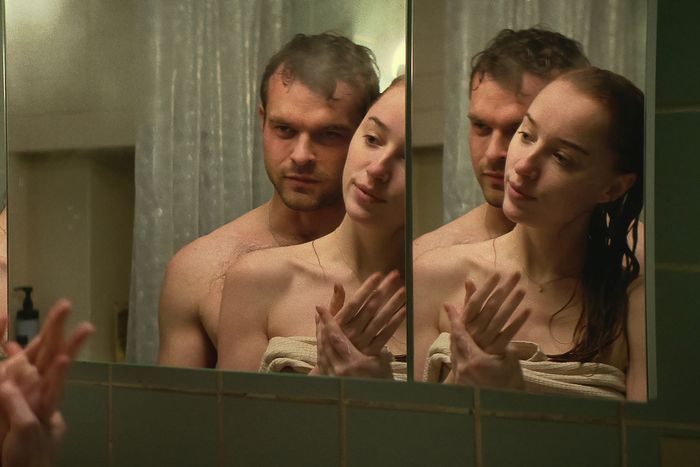
Fair Play defines itself by parallels, by how words, objects, and events take on different textures in different contexts. A smear of blood is sensual in one scene, fearsome in another; a drink after work is celebratory before it becomes exclusionary; a lie is innocuous, then damaging. Chloe Domont’s film divides the entire world into binary moments of understanding and misunderstanding — without the shades of gray that would make Fair Play and its characters more tangible and its central tension less didactic. That approach is limiting enough that it ultimately restrains the film, keeping it from fully taking advantage of the genres it references (the erotic thriller, the boiler-room drama). Instead, it settles for a female-empowerment ending that is foreshadowed loudly enough to feel slightly hollow.
Domont’s directorial debut follows 20-somethings Emily (Phoebe Dynevor, whose breakout role on the steamy Bridgerton makes her uniquely suited to a film pondering what impact sex has on relationships) and Luke (a convincingly self-involved Alden Ehrenreich), co-workers at Manhattan hedge fund One Crest Capital. Against company policy, they’ve dated in secret for two years and told elaborate lies to keep from getting found out: taking separate routes to work, making only polite small talk when other people are around, not socializing with co-workers. (I quibble at how no one in management would pick up on their relationship when their W-2s share an address, but anyway.) After a spontaneous romp in a public bathroom, Luke proposes and Emily says yes; later that week, Emily overhears other analysts throwing Luke’s name around when discussing who will be promoted next. Everything is going Luke’s way, until Emily is called to a 2 a.m. meeting with company CEO Campbell (Eddie Marsan) — who offers her the coveted job.
This is Domont’s first full-length film, and her previous TV writing and directing work on shows like Ballers, Billions, and Clarice have made her particularly adept at visualizing the demands of high-pressure workplaces, especially those with few roles for women. The open-concept design of the film’s boiler room emphasizes Emily’s aloneness, with its shared space for the analysts (all men, except for her) and its glass-walled offices for the portfolio managers and executives (again, all men). Everyone is watching everyone else all the time, and as news of Emily’s promotion spreads through One Crest Capital, Domont uses the reactions of Emily’s co-workers — their half-lustful, half-resentful looks as she walks in each morning, their scoffs when she speaks during a meeting, their whispered musings on how she really got the job — to build a cresting wave of gender-based judgment.
There’s a familiarity to this panopticon, and to how Emily becomes unsure of herself at the center of it; Dynevor nails both the character’s defensiveness and her one-of-the-guys impulsiveness when her new co-workers suggest they spend the night at — of course — a strip club. A third-act conversation between her and Marsan’s Campbell, in which protégé and mentor parry lies back and forth in a cocoon of wealth and prestige, might be the film’s best exchange. Ehrenreich, meanwhile, turns out to be a wonderfully navel-gazing Nice Guy, capable of myriad flavors of red-faced yelling and overdone self-abasement. Fair Play uses cringe to its advantage, pointedly mocking the hypocrisy of the finance industry when the spurned Luke delivers an anti-industry speech and then jealously widens his eyes after learning a colleague brought in $90 million in returns in just one quarter, and when it juxtaposes an HR training session on accountability against a portfolio manager’s expletive-filled freak-out in an adjacent office. But the script is too thin for these successful components to add up to a more incisive point about gender dynamics in the workplace and at home.
Fair Play is so unwavering in its yes-all-men messaging that it fails to define Emily and Luke through anything other than their cishet identities; there’s no background on whether Emily or Luke had other interests or personalities before being bound together by work and romance, why they chose these careers or what initially attracted them to each other. What Fair Play would rather do is stay in the present and repeat the same tableaus to provide contrasting layers of meaning, but that execution loses its efficacy after a while. Take the film’s sex and fight scenes, which are shot the same way — all facial close-ups and rapid editing — to emphasize the similar emotions running through Emily and Luke in moments of lust and loathing. The point is made early, but Fair Play goes back to it with diminishing effect. What Fair Play can’t quite deliver is the nuance needed to make these comparisons between men and women unique or new, and to push itself past archetypes and parables. The ending might be cathartic, but it also feels like Fair Play cashing a check it didn’t quite earn.
More Movie Reviews
- In Once Within a Time, Godfrey Reggio Presents a Startling Vision of the World
- We Don’t Talk Enough About the Bizarre Exorcist Films
- Cat Person Is Cringe Horror





